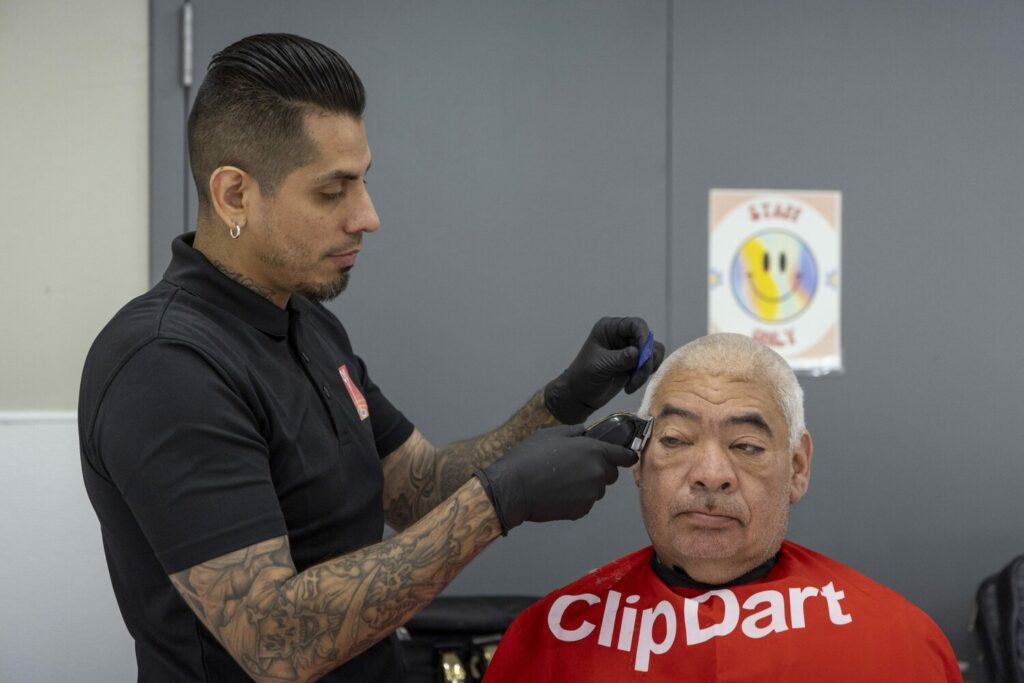David Ulloa Jr. | Cronkite News
GLENDALE — Amid the low hum of clippers and the click-clack of scissors cutting hair, a group of seniors sit at a rectangular table at the Glendale Community Center.
As a staff member calls out the names of the icons on playing cards in broken but good-natured Spanish, they place beans on their loteria cards, a traditional Mexican game similar to bingo. As soon as one customer finishes his haircut, he jumps out of his salon chair and joins the others in filling up their cards and yelling “Loteria!” to see if he can win the game.
The barbers and hairdressers at the Glendale Community Center are part of a nonprofit called The ClipDart Giveback, a group of mobile barbers and hairdressers dedicated to improving the mental health of vulnerable communities by providing an authentic barbershop and salon experience.
According to the company's website, ClipDart was founded to address the inequity in access for students of color and other disadvantaged groups to affordable, quality hair services from barbers and hairstylists skilled in cutting hair, particularly for people of color.
ClipDart has two pillars: ClipDart Inc. and ClipDart Giveback.
According to its website, ClipDart works with institutions to help people of color who attend predominantly white universities or neighborhoods who don't have access to barbershops that meet their cultural needs, like cutting textured hair. ClipDart organizes barbers from nearby cities to provide these services.
ClipDart Giveback is the nonprofit arm of the organization, which partners with human service organizations across the country to provide frequent, free haircuts to those in need, according to the organization's website.
David Rodriguez, Clip Dart's barber and chief strategy officer, said the organization is growing quickly because there are so many vulnerable people, especially in Black and Hispanic communities.
“We have a large population, but no one understands us as well as we do. Our barbers and hairdressers come to you, so we can bring back the culture that gets lost when you go to other areas where there aren't people like you,” Rodriguez said.
Rodriguez said the organization is growing as barbers and hairdressers recreate the barbershop experience and connect with customers on a personal level.
When ClipDart prepares for an event, Rodriguez said, they bring along a barbershop-style chair and a mobile barber stand, a case that holds all the tools used to cut hair. To further mimic the barbershop atmosphere, Rodriguez often brings along speakers and plays music that's popular in the community.
While cutting a customer's hair, barbers and hairdressers talk to them about topics such as money, sports and their personal lives, Rodriguez said.
While getting his hair cut, Daniel Holguin, a volunteer at the community center, said he likes Rodriguez because he is honest and gives good haircuts.
“He knows how to treat people and he speaks to people with courtesy,” Holguin said.
Rodriguez said the combination of music and a professional mobile barbershop “completes the circle of the barbershop experience.”
“We have everything a regular barbershop has, but we're giving our customers the barbershop experience, and that's why we're growing so fast,” Rodriguez said.
Moraima Robledo, a hairstylist for 25 years and Clip Dart volunteer, said she felt welcomed into the family the seniors at the Glendale Community Center have created.
“When we come, they say, 'That lady is here!' It's so lovely because they know we'll laugh and talk to them,” Robredo said.
Robredo said it's not easy for barbers and hairdressers to get clients to hug them, but her clients often hug her, and she believes her experience working with families with disabilities has helped her make personal connections with her clients.
ClipDart visits certain organizations frequently, and Rodriguez says many of their customers already know them and often ask when they leave, “When are you coming back?”
Rodriguez said that's always a good sign because it means customers want to make time to visit a barber or hair salon more frequently.
The upbeat scene at the community center on the day Cronkite News visited resembled “Barbershop,” the 2002 film about a day in the life of a barbershop on Chicago's South Side.
As the loteria game continued and Rodriguez and Robredo brushed off excess hair to finish customers' haircuts, visitors to the community center rose to their feet and began dancing to the sounds of cowbells and accordions from the song “El Tucanes de Tijuana” by Los Tucanes de Tijuana.

